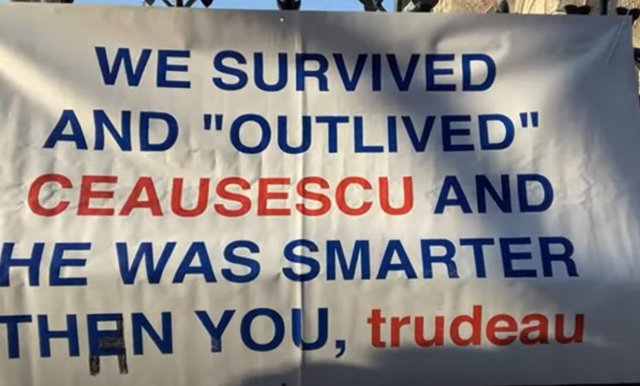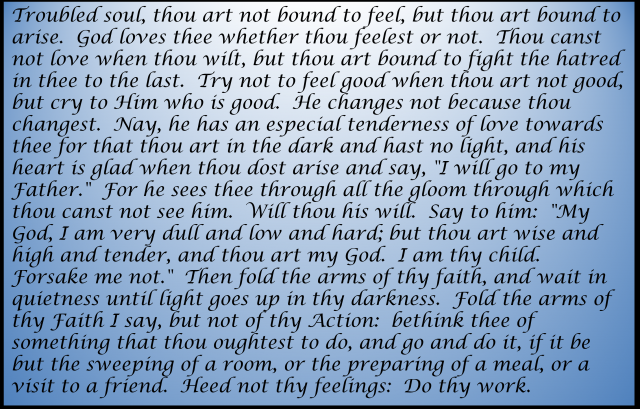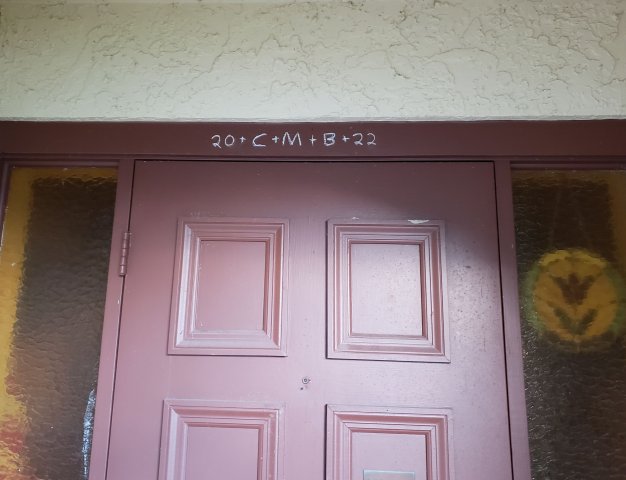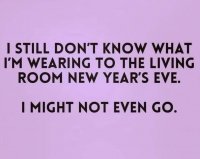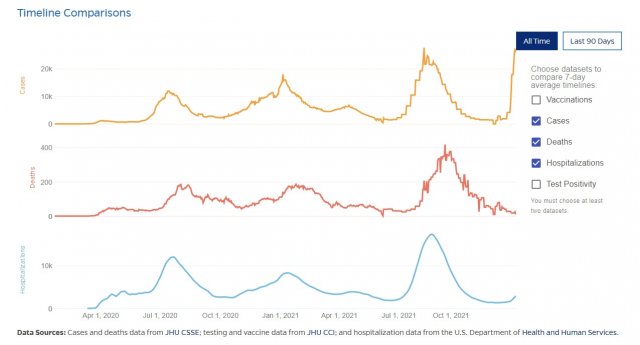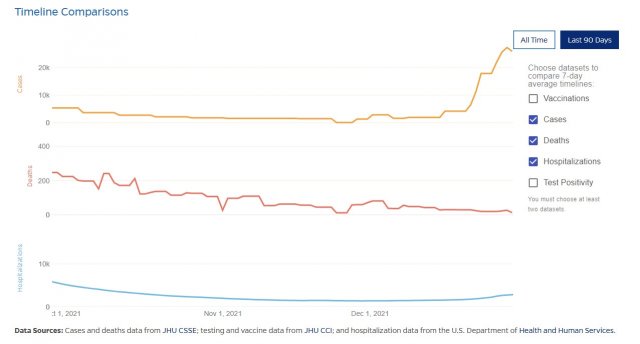We interrupt all the troubles of the world for a feel-good story that occurred just hours after we left Chicago.
Pepper the dog is alive and well, thanks to the efforts of Chicago firefighters—who happened to be nearby, practicing underwater ice dives—when he slipped his leash and fell into icy Lake Michigan.
[Fire Deputy District Chief Jason Lach] said standard dive rescue procedure calls for a truck full of divers, a police squad, a battalion chief, a field officer, a fire truck, a fire engine, two ambulances and a helicopter. Officials in the helicopter spotted Pepper on an ice chunk about 500 feet out. ...
Veteran firefighters Chris Iverson and Emerson Branch dove in to bring back Pepper. The dive team tethered lines and laid out two 15-foot ladders to make a subtle decline above icy rocks so Iverson and Branch could safely slide into the water. Iverson, dressed in a full-body thermal suit, swam to Pepper in less than five minutes. Pepper got nervous and growled, then slipped off the ice chunk and into the cold water. But Pepper got up, and Iverson snapped a snare to capture the dog in a safety sling. Pepper snuggled up to his rescuer.
Branch swam out with a Rapid Deployment Craft.... Branch helped Iverson and Pepper into the craft and guided them back toward shore. The entire rescue took about 15 minutes.
It's a bit more extreme than the standard trope of firemen rescuing a cat from a tree, but it's the same heroic impulse. And no doubt it made their "underwater ice dive" practice considerably more interesting.
Permalink | Read 1146 times | Comments (0)
Category Everyday Life: [first] [previous] [next] [newest]
You will hear soon about our wonderful trip to Chicago, but current events are taking precedence today.
I hate crowds. All my senses are hyper-sensitive, and I'd go crazy in one of those cultures where people like to be close to your face and touch you frequently. So—not a good candidate for the thrill of the crowd. Times Square on New Year's Eve is not for me.
More than that, I have a healthy fear of the mob mentality. People do stupid things in groups that they would never do without the urging and peer pressure of the mob. You will not be surprised that I am very leery of participating in any kind of political demonstration, child of the sixties though I may be.
Actually, I'd brave the crowds to show my support for a good cause, and I have done so once or twice, but even the most peaceful demonstrations these days are vulnerable to infiltration by those whose goal is to cause trouble. Whether from fringe "friends" of the cause, enemies determined to discredit the demonstrators, or mere opportunistic looters, things can go bad quickly, and the risk of getting caught up in them is real.
All that said, part of me would really like to be standing in Ottawa with Canada's truckers and their Freedom Convoy.
It started in British Columbia, sparked by Canada's new rule that any truckers crossing the border from the United States must show proof of COVID-19 vaccination.
You really shouldn't mess with the people who transport food and other essential goods, especially when your country is already having supply chain issues.
The fed-up truckers started a convoy from British Columbia, across most of Canada to the capital city of Ottawa. Along the way the convoy grew, as more and more truckers, and other supporters, joined. It turns out that truckers aren't the only ones who are "mad as hell and not gonna take this anymore" (3.5 minutes, language warning).
Despite that appropriate clip (from a movie I know nothing about), these "mad as hell" protesters are incredibly friendly and peaceful. I don't know what you may have heard about the Freedom Convoy, but the reaction of the media has been ... interesting. First they ignored the protest, and when it finally got so large they couldn't ignore it, they tried to demonize it, calling the participants "racist, misogynist, white-supremacist, insignificant radical fringe elements," and accusing them of all sorts of objectionable behaviors.
So on Monday, David Freiheit (Viva Frei) drove from Montreal to Ottawa to see for himself, and document his experience in a livestream. Yesterday, I made it through 2.5 hours of video, to the point where his camera gave out. Then I went to bed, figuring to write this post in the morning.
I awoke to another three hours of video, because his camera had merely run into a brief issue that was soon fixed. That was more than I could handle, but I did watch the beginning, the end, and several samples in between.
It's a livestream, unscripted, unedited, simply showing his experiences as he walked the streets of the city and interacted with the people. He specifically sought out evidence of the negative reports. According to the news, there had been Confederate flags (in Canada?) and swastikas, along with desecrations of memorials.
Freiheit found no such thing, nor had any of the people he interviewed seen them. He did find one person who said someone had let the air out of her tires, and a report of a window accidentally broken by someone's waving flag. And one of the memorials spoken of had had some flowers put at the base, and a bouquet of flowers put in the statue's hand. The only objectionable thing I saw was a number of signs expressing a rude sentiment all too familiar in demonstrations when Donald Trump was president, with Prime Minister Trudeau's name substituted for Trump's. I did see a rather clever twist on the "Let's go Brandon" theme: Let's go Brandeau.
Speaking of signs, here's my favorite.
It shows how young Freiheit is—he was born in 1979—because he said he didn't understand it. None of us who were adults in the 1980's can forget the atrocities of Romania's infamous dictator, Nicolae Ceaușescu. These are, no doubt, the sentiments of a Romanian refugee shocked by the situation in "free, democratic" Canada.
It's also my favorite sign because someone noticed and corrected "then" to "than."
As far as I could tell, people may be angry about the government's policies, but they mostly seemed thrilled to get together with like-minded citizens and express their opinions. It could have been a block party. Smiles, hugs, excitement. Mutual respect between the demonstrators and the police. No litter on the street—the protesters made an effort to keep it clean. And they also shovelled the sidewalks! No rioting, no looting, no violence, no evidence of the bitter hatred so prevalent in recent protests south of the Canadian border. I knew there was a reason I've always liked Canada. They deserve better politicians, and certainly better policies.
You don't have to take my word for it; you can sample the streams yourself.
Part 1 (2.5 hours)
Part 2 (3 hours)
I found it exciting to watch, to be a part of it if only virtually, and to know that the event has been nothing like the news reports have portrayed it. May it stay the happy, if determined, protest that it is, as time goes on and people get more tired, cold, and frustrated.
If I had to live or work near Parliament Hill in Ottawa, I would quickly get tired of the sound of blaring truck horns, which sliced through my head even on the video. And no one can be happy about the traffic jams, even though long lines of trucks have been blocked from entering the city, in order to keep roads open for emergency vehicles.
I hope Canada's politicians quickly come to the realization that these people are also Canadian citizens they are sworn to serve, and learn to listen with respect. It's time to let the truckers—and everyone else—get on with their business.
The line between truth-telling and fear-mongering may be thinner than I'd like to believe.
I legitimately criticize most popular media outlets and others whose profits are driven by making people upset and afraid: I haven't seen such irresponsible journalism since the late 60's and early 70's. And yet I repeatedly write and share posts that I myself find frightening, because I think they highlight important information. If fear and panic are unhelpful, so are ignorance and denial. So I'll continue to publish information that I believe needs to be more widely known, trying not to be incendiary about it.
David Freiheit, my favorite Canadian lawyer/journalist, has given me gold mines of information about the legal aspects of current events. When I first began listening to his Viva Frei YouTube shows, one of the things that attracted me to him was his calm, balanced approach to events. I miss that. Now, after two years of pandemic stress, he's a bit edgier and angrier. But who can blame him? He lives in Montreal, where the provincial and federal governments continue to make unreasonable, unscientific, and inhumane intrusions into the lives of its people—far worse than anything we have had to endure. So please be patient with his anxiety; what he says is almost always eye-opening.
Below is a short clip from the full show that I will embed further on. This clip is only a minute and a half long, and if you don't find frightening both this use of children for propaganda purposes and what the children say with such enthusiasm, perhaps a study of 20th century history is in order. Or a reading of Orwell's Nineteen Eighty-Four. Or a chat with someone who fled to the United States from a totalitarian country.
Here's the full video (12.5 minutes) of which the story of the children is just a sidebar. I've been referring to Florida as a "free state" given what I consider to be our relatively reasonable response to the pandemic, but this Miami judge proves that we are hardly monolithic in our actions and opinions. Note that the issue is not so much the judge's desire to insist that all potential jurors be vaccinated, nor even his insulting, demeaning, and incendiary language, but a legal problem: "These judges are rendering decisions based on evidence that has not been adduced and that is not how the court system works."
In case you don't watch the video but are curious about the "insulting, demeaning, and incendiary language," this is what the judge wrote in his ruling, which was on the face of it a simple postponement of a trial because the defense counsel did not want the jury pool limited by vaccination status.
It is the Court's belief that the vast majority of the unvaccinated adults are uninformed and irrational, or—less charitably—selfish and unpatriotic.
Even if you completely agree with the judge, the children, and the teacher, these stories should send shivers down your spine.
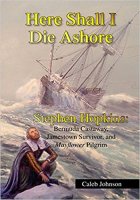 Here Shall I Die Ashore: Stephen Hopkins—Bermuda Castaway, Jamestown Survivor, and Mayflower Pilgrim by Caleb Johnson (Xlibris 2007)
Here Shall I Die Ashore: Stephen Hopkins—Bermuda Castaway, Jamestown Survivor, and Mayflower Pilgrim by Caleb Johnson (Xlibris 2007)
I discovered Caleb Johnson's Mayflower History website while researching for Porter's application for membership in the General Society of Mayflower Descendants. Of the three Mayflower ancestors Porter's family lore put forth as candidates, I chose to pursue Stephan Hopkins soley because that line appeared to be the easiest to document.
MayflowerHistory.com was one of the most interesting sources I found. After some initial skepticism—the value of genealogical information that can be found online ranges from fantastic to abysmal—I recognized Johnson as an authoritative source and entertaining to boot. After proving Porter's descent from Stephen Hopkins to the satisfaction of the Mayflower Society, I gave him Here Shall I Die Ashore for Christmas.
Even before reading the book, I posted a brief summary of Hopkins' life that will give you the gist of his story. But the book is ever so much more than that, a story better told and with more history, context, and detail. I learned a lot I didn't know about the early days of the Jamestown colony in Virginia, and Plymouth in Massachusetts, as well as about Stephen himself.
We all know the Native Americans did not get what they were hoping for out of the arrival of the colonists from England. What I hadn't realized is that nobody involved in these expeditions did. And nobody had a clue how bad the colonists' situations were and how much worse they were going to get. Just when a colony began to (just barely) get a grip on providing food for itself, the folks back in England, frustrated by failed promises of return on their investments, kept sending, not badly-needed supplies, but more hungry mouths to feed. (A number of my own ancestors were on those ships that followed the Mayflower.)
You can't build a healthy colony without women, but women didn't do the kind of work that produced trade goods, so investors were reluctant to allow them to take up space on their ships. It's easy to see the financial backers as heartless, but I'm quite sure most of them were merely clueless. Even in these days of instant communication and near-instant travel, how many of us know what our financial investments—and our charitable contributions—are really doing? And who wouldn't be upset with tenants who don't take care of the property and refuse to pay rent?
Following the initial financial difficulties, long-time Leiden church member and Mayflower passenger Isaac Allerton was appointed to return to England, to start negotiations with the London shareholders and other financial backers. In November 1626, an agreement was reached. The Plymouth colonist-shareholders would purchase the outstanding shares of the company from all the remaining English investors...and assume the colony's debt. The overall adventure was a substantial loss to the London investors—most only got back about a third of their original investment—but the forty-two remaining London shareholders were happy to get out with whatever they could, as most now expected they would eventually lose everything. (pp. 123-124)
Plymouth fared better than Jamestown, thanks to having a population experienced in self-discipline and hard work. Too many of Jamestown's people were of a class accustomed to being served, and whose skills were a very bad mismatch with what the colony needed to survive.
One very important lesson was learned at Plymouth after the ship Anne arrived in 1623, bringing much-longed-for wives, children, and single women.
Up until the Anne's arrival, the Plymouth colonists had worked and farmed collectively; all the crops were brought into a collective company storehouse and then rationed back out to everyone (the employees) in equal allotments. But Governor Bradford and the others soon realized this was not working out as well as had been intended—the productive individuals were getting allotted the same amount as the lazy do-nothings of the colony, and this was killing morale. Bradford's solution: allot everyone their own lots of land, for their own benefit and subsistence. Every person (man, woman and child) received an acre of land, which were logically combined together into larger family plots. (p. 121)
Credit the women, credit free enterprise, or credit finally being out from under the thumbs of clueless managers, but Plymouth finally began to thrive. And so did the Hopkins family.
Most readers will happily stop halfway through the book, where the story of Stephen Hopkins ends. But 115 pages of appendices include much of interest to genealogists and historians, including scholarly articles on the identity and origin of Stephen Hopkins, his descendants to the first three generations, three original-source documents covering Bermuda, Jamestown, and Plymouth, and Stephen's will and estate inventory.
—George MacDonald, Unspoken Sermons, Volume 1, "The Eloi"
Permalink | Read 1078 times | Comments (0)
Category Inspiration: [first] [previous] [next] [newest]
The science fiction writers of the 20th century were often startlingly accurate in their technological predictions, as when Arthur C. Clarke suggested, in 1945, the use of satellites in geostationary orbit to facilitate worldwide communication. They also frequently missed the mark: we hold more computing power in our hands than those writers could imagine, yet we still don't have personal jet packs, let alone interstellar travel.
Science fiction often made social predictions as well, and they too sometimes hit the mark. Here, for example, is a quote from Randall Garrett's Anything You Can Do (published in 1963).
The number of people killed in ordinary accidents in a single week was greater than the total number killed by the Nipe in the last decade, but nowhere were men banding together to put a stop to that sort of death. Accidental death was a known factor, almost a friend; the Nipe was stark horror.
Replace "the Nipe" with "COVID-19" or "guns" and you get the same attitude.
The next is from The Highest Treason (1961). In the 60 years that have passed since it was written, I have seen this prediction come true with a vengeance for much of the Western world.
Marriage was a social contract that could be made or broken at the whim of the individual. It served no purpose because it meant nothing, neither party gained anything by the contract that they couldn't have had without it. But a wedding was an excuse for a gala party at which the couple were the center of attention. So the contract was entered into lightly for the sake of a gay time for a while, then broken again so that the game could be played with someone else.
More from The Highest Treason. If we haven't yet managed economic levelling, it's not for want of people pushing for just that. We've already made long strides in the battle against high standards and excellence, particularly in education.
Earth was stagnating. Every standard had become meaningless because no standard was held to be better than any other standard. There was no beauty because beauty was superior to ugliness and we couldn't allow superiority or inferiority.
Society had decided that intolerance and hatred were caused by inequality. Raise the standard of living. Make sure that every human being has the necessities of life—food, clothing, shelter, proper medical care, and proper education. More, give them the luxuries, too.... There was no longer any middle class simply because there were no other classes for it to be in the middle of.
But the poor in mind and the poor in spirit were still there—in ever-increasing numbers. Material wealth could be evenly distributed, but it could not remain that way unless Society made sure that the man who was more clever than the rest could not increase his wealth at the expense of his less fortunate brethren. Make it a social stigma to show more ability than the average. Be kind to your fellow man; don't show him up as a stupid clod, no matter how cloddish he may be.
All men are created equal, and let's make sure they stay that way!
Well, that's depressing. It's a good thing that as a child the social commentary in my beloved science fiction stories went over my head, probably because I had no interest in it. Or maybe this is the sort of thing that only becomes obvious when we can look back over the years.
Permalink | Read 1160 times | Comments (0)
Category Random Musings: [first] [previous] [next] [newest]
Chick-fil-A posted this sign:
Today, we remember a
great leader, humanitarian
and Atlantan, while pausing
to reflect on his legacy
When you're retired, most Federal holidays boil down to "days on which we don't get any mail." But yes, I do know what today is. Nonetheless, I puzzled over this longer than I should have. Atlantan? What mythological association links Martin Luther King, Jr. with the Lost City?
It didn't take too many seconds for the penny to drop, but this may be an indication that my recent reading has been heavily weighted towards the Fantasy genre.
Permalink | Read 1043 times | Comments (0)
Category Random Musings: [first] [previous] [next] [newest]
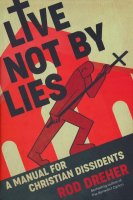 Live Not by Lies: A Manual for Christian Dissidents by Rod Dreher (Sentinel, September 2020)
Live Not by Lies: A Manual for Christian Dissidents by Rod Dreher (Sentinel, September 2020)
My previous book having been Brandon Sanderson's Oathbringer, this book's 256 pages might have made it seem like a beach read.
Not by a long shot.
I was struck by how much Live Not by Lies reminded me of The Fall of Heaven, although they are two very different books with very different subjects. The latter details Iran at the time of the 1978 revolution, while this book is largely based on stories from the survivors of Communism in Russia and Eastern Europe. What do they have in common? The warning that it CAN happen here. America is not so far off from totalitarianism as we naïvely think.
There always is this fallacious belief: “It would not be the same here; here such things are impossible.” Alas, all the evil of the twentieth century is possible everywhere on earth. — Aleksandr Solzhenitsyn, The Gulag Archipelago
This was certainly the fallacy I believed in.
When I was a child, Nazi Germany was a very near memory for my parents, and the horrors of Communism an ever-present reality. But I knew for certain that it couldn't happen here and it couldn't happen now, because America was free and the democracies had grown beyond all that totalitarian stuff. True, I was forced in school to read 1984 and Brave New World, but such situations were as alien to me as the farthest galaxies. Ah, the optimism of youth.
Did I say youth? If you'd asked me five years ago I would have pretty much felt the same way. But the last few years have shown just how quickly radical change can happen.
Enter Live Not by Lies. Dreher was inspired by the stories and concerns of those who escaped totalitarian societies (largely from Eastern Europe and the former Soviet Union) only to see frighteningly similar patterns in present-day America. He is careful to distinguish what he calls "hard totalitarianism" with its secret police, gulags, and material deprivation, and the sneaky, but effective, "soft totalitarianism" that threatens us today. He comes down very hard on the Left, but neither does he spare the Right. Evil is most effective when it uses both halves of the nutcracker.
As indicated in the title, Live Not by Lies is written for Christians. But it would be a great mistake for others to pass it up for that reason. The most effective resistance to the hard totalitarianism of Nazism and Communism came from diverse coalitions of dissidents, and that's just as important now. These are dangers that affect us all.
It's not a totally satisfying book, the second half being less powerful than the first—at least if I judge by the relative number of passages I highlighted. I could include a great number of quotations in this review, but I'm not going to. Live Not by Lies is only $4.99 in Kindle form. Give up one fast food meal and get a book that just might open your eyes and strengthen your spine.
The following, rather long, excerpt from the introduction explains well the form and scope of the book.
Part one of this book makes the case that despite its superficial permissiveness, liberal democracy is degenerating into something resembling the totalitarianism over which it triumphed in the Cold War. It explores the sources of totalitarianism, revealing the troubling parallels between contemporary society and the ones that gave birth to twentieth-century totalitarianism. It will also examine two particular factors that define the rising soft totalitarianism: the ideology of “social justice,” which dominates academia and other major institutions, and surveillance technology, which has become ubiquitous not from government decree but through the persuasiveness of consumer capitalism. This section ends with a look at the key role intellectuals played in the Bolshevik Revolution and why we cannot afford to laugh off the ideological excesses of our own politically correct intelligentsia.
Part two examines in greater detail forms, methods, and sources of resistance to soft totalitarianism’s lies. Why is religion and the hope it gives at the core of effective resistance? What does the willingness to suffer have to do with living in truth? Why is the family the most important cell of opposition? How does faithful fellowship provide resilience in the face of persecution? How can we learn to recognize totalitarianism’s false messaging and fight its deceit?
How did these oppressed believers get through it? How did they protect themselves and their families? How did they keep their faith, their integrity, even their sanity? Why are they so anxious about the West’s future? Are we capable of hearing them, or will we continue to rest easy in the delusion that it can’t happen here?
A Soviet-born émigré who teaches in a university deep in the US heartland stresses the urgency of Americans taking people like her seriously. “You will not be able to predict what will be held against you tomorrow,” she warns. “You have no idea what completely normal thing you do today, or say today, will be used against you to destroy you. This is what people in the Soviet Union saw. We know how this works.”
On the other hand, my Czech émigré friend advised me not to waste time writing this book. “People will have to live through it first to understand,” he says cynically. “Any time I try to explain current events and their meaning to my friends or acquaintances, I am met with blank stares or downright nonsense.”
Maybe he is right. But for the sake of his children and mine, I wrote this book to prove him wrong. (pp. xiv-xvi)
I'll let Aleksandr Solzhenitsyn have the last word.
After the publication of his Gulag Archipelago exposed the rottenness of Soviet totalitarianism and made Solzhenitsyn a global hero, Moscow finally expelled him to the West. On the eve of his forced exile, Solzhenitsyn published a final message to the Russian people, titled “Live Not by Lies!” In the essay, Solzhenitsyn challenged the claim that the totalitarian system was so powerful that the ordinary man and woman cannot change it. Nonsense, he said. The foundation of totalitarianism is an ideology made of lies. The system depends for its existence on a people’s fear of challenging the lies. Said the writer, “Our way must be: Never knowingly support lies!” You may not have the strength to stand up in public and say what you really believe, but you can at least refuse to affirm what you do not believe. You may not be able to overthrow totalitarianism, but you can find within yourself and your community the means to live in the dignity of truth. If we must live under the dictatorship of lies, the writer said, then our response must be: “Let their rule hold not through me!” (pp. xii-xiv)
Permalink | Read 1658 times | Comments (0)
Category Reviews: [first] [previous] [next] [newest] Hurricanes and Such: [first] [previous] [next] [newest] Politics: [first] [previous] [next] [newest] Last Battle: [first] [previous] [next] [newest]
Our city has long been in the forefront of innovation when it comes to wastewater treatment. I'm proud of Altamonte Springs. The latest news, however, has me puzzled.
They're now testing our wastewater for evidence of COVID-19 infections.
Actually, I think that sounds clever. It's the results I question. According to this news story, 70% percent of our residents are infected with COVID-19.
Seventy percent! Does that make any sense at all? Later in the same story, it is claimed that half of the people getting tested are positive.
Wait just a minute. Who is it who gets tested? I know that some folks submit to testing, sick or not, because of their jobs, their travel plans, or because they've gone into the hospital with a broken leg and been tested for COVID because that's what hospitals do. But generally speaking, the people who bother to get tested are those who are experiencing some symptoms of illness. Those of us who think we are healthy don't bother.
So how is it that 70% of us actually have COVID when the tests, heavily weighted towards those who know they are sick, are only coming in at 50%?
All I can think of is that the COVID tests, or being ill with something other than COVID, or even breaking your leg, is somehow protective against the COVID-19 virus itself.
This may be a strange disease, but come on, it's not that strange.
It's time for my annual compilation of books read during the past year.
- Total books: 85
- Fiction: 66
- Non-fiction: 19
- Months with most books: a tie between July and September (12)
- Month with fewest books: April (2)
- Most frequent authors: Randall Garrett (19), Lois Lenski (16), Tony Hillerman (10), Brandon Sanderson (7). Hillerman is the only author to make the top four both last year and this, as his excellent Leaphorn & Chee books spanned the two years. Garrett and Lenski made such a strong showing because they were each the subject of a particular focus, and their books are generally short. Sanderson, on the other hand, though he's only represented by seven books, is the runaway leader in number of pages.
Here's the list, grouped by author; links are to reviews. The different colors only reflect whether or not you've followed a hyperlink. The ratings (★) and warnings (☢) are on a scale from 1 to 5, with 1 being the lowest/mildest. Warnings, like the ratings, are highly subjective and reflect context, perceived intended audience, and my own biases. Nor are they completely consistent. They may be for sexual content, language, violence, worldview, or anything else that I find objectionable. Your mileage may vary.
| Title | Author | Rating/Warning |
| Matthew Wolfe 2: The Adventures Begin | Blair Bancroft (Grace Kone) | ★★★ ☢ |
| Matthew Wolfe 3: Revelations | Blair Bancroft (Grace Kone) | ★★★ |
| The Art of Evil | Blair Bancroft (Grace Kone) | ★★★★ ☢ |
| Mistborn 1: The Final Empire | Brandon Sanderson | ★★★ |
| Mistborn 2: The Well of Ascension | Brandon Sanderson | ★★★ |
| Mistborn 3: The Hero of Ages | Brandon Sanderson | ★★★ |
| Stormlight 1: The Way of Kings | Brandon Sanderson | ★★★ |
| Stormlight 2: Words of Radiance | Brandon Sanderson | ★★★★ |
| Stormlight 2.5: Edgedancer | Brandon Sanderson | ★★★★★ |
| Warbreaker | Brandon Sanderson | ★★★★ |
| Deep Work | Cal Newport | ★★★★★ |
| So Good They Can't Ignore You | Cal Newport | ★★★★★ |
| Rosefire | Carolyn Clare Givens | ★★★ |
| A Child's History of England | Charles Dickens | ★★★ ☢ |
| The Light in the Forest | Conrad Richter | ★★ |
| Just David (aka North to Freedom) | Eleanor Porter | ★★★★ |
| Just David (read a second time to check for differences between the original and the modern editions) | Eleanor Porter | ★★★★ |
| Brian's Saga 1: Hatchet | Gary Paulsen | ★★★ ☢ |
| Brian's Saga 2: The River | Gary Paulsen | ★★★ ☢ |
| Brian's Saga 3: Brian's Winter | Gary Paulsen | ★★★ ☢ |
| Brian's Saga 4: Brian's Hunt | Gary Paulsen | ★★ ☢☢ |
| Brian's Saga 4: Brian's Return | Gary Paulsen | ★★ ☢ |
| Why Good Arguments Often Fail | James W. Sire | ★★★★ |
| Discipline Equals Freedom: Field Manual | Jocko Willink | ★ |
| Extending the Table: A World Community Cookbook | Joetta Handrich Schlabach | ★★ |
| Greenglass House | Kate Milford | ★★★ |
| Kisses from Katie | Katie Davis with Beth Clark | ★★★ |
| Bayou Suzette | Lois Lenski | ★★★★ |
| Blue Ridge Billy | Lois Lenski | ★★★★ |
| Boom Town Boy | Lois Lenski | ★★★★ |
| Coal Camp Girl | Lois Lenski | ★★★★ |
| Corn Farm Boy | Lois Lenski | ★★★★ |
| Deer Valley Girl | Lois Lenski | ★★★ |
| Flood Friday | Lois Lenski | ★★★★ |
| Houseboat Girl | Lois Lenski | ★★★★ |
| Indian Captive | Lois Lenski | ★★★★ |
| Judy's Journey | Lois Lenski | ★★★★ |
| Mama Hattie's Girl | Lois Lenski | ★★★★ |
| Prairie School | Lois Lenski | ★★★★ |
| San Francisco Boy | Lois Lenski | ★★★★ |
| Shoo-Fly Girl | Lois Lenski | ★★★ |
| Strawberry Girl | Lois Lenski | ★★★★ |
| Texas Tomboy | Lois Lenski | ★★★★ |
| Out of This World | Lowell Thomas, Jr. | ★★★★ |
| Talking to Strangers | Malcolm Gladwell | ★★★★ |
| Humble Pi | Matt Parker | ★★★★ |
| In the Heart of the Sea | Nathaniel Philbrick | ★★★ ☢ |
| The Wild Robot | Peter Brown | ★★★★ |
| The Wild Robot Escapes | Peter Brown | ★★★★ |
| A Spaceship Named McGuire | Randall Garrett | ★★★ |
| Anything You Can Do | Randall Garrett | ★★★ |
| But, I Don't Think | Randall Garrett | ★ |
| By Proxy | Randall Garrett | ★★★ |
| Cum Grano Salis | Randall Garrett | ★★★★ |
| Damned If You Don't | Randall Garrett | ★★★ |
| Despoilers of the Golden Empire | Randall Garrett | ★★★ |
| His Master's Voice | Randall Garrett | ★★★ |
| Nor Iron Bars a Cage | Randall Garrett | ★★★ |
| Or Your Money Back | Randall Garrett | ★★★ |
| Pagan Passions | Randall Garrett | ★★ ☢☢ |
| Psi-Power 1: Brain Twister | Randall Garrett | ★★★ |
| Psi-Power 2: The Impossibles | Randall Garrett | ★★★ |
| Psi-Power 3: Supermind | Randall Garrett | ★★ |
| Quest of the Golden Ape | Randall Garrett | ★★ |
| The Eyes Have It | Randall Garrett | ★★★★ |
| The Foreign Hand-Tie | Randall Garrett | ★★★ |
| The Highest Treason | Randall Garrett | ★★★ |
| The Penal Cluster | Randall Garrett | ★★ |
| Loserthink | Scott Adams | ★★★ |
| Life of Fred: Pre-Algebra 0 with Physics | Stanley F. Schmidt | ★★★★ |
| Life of Fred: Australia | Stanley F. Schmidt | ★★★★ |
| Life of Fred: Pre-Algebra 2 with Economics | Stanley F. Schmidt | ★★★★ |
| Life of Fred: Trigonometry Expanded Edition | Stanley F. Schmidt | ★★★★ |
| Coyote Waits | Tony Hillerman | ★★★ |
| Hunting Badger | Tony Hillerman | ★★★ |
| Sacred Clowns | Tony Hillerman | ★★★ |
| Skeleton Man | Tony Hillerman | ★★★ |
| Skinwalkers | Tony Hillerman | ★★★ |
| The Dark Wind | Tony Hillerman | ★★★ |
| The Ghostway | Tony Hillerman | ★★★ |
| The People of Darkness | Tony Hillerman | ★★★ |
| The Shape Shifter | Tony Hillerman | ★★★ |
| The Wailing Wind | Tony Hillerman | ★★★ |
| The Bible (English Standard Version, canonical) | ★★★★★ | |
| The New Testament (King James Version, canonical) | ★★★★★ |
It is January 6.
"Chalking the door" is done.
At our crêche, the Wise Men have completed their journey.
Christmas (all 12 days) is officially over, and it's time to put away the decorations.
Alas, we have no Epiphany service at church today, though in true Episcopalian compromise fashion we gave it a nod last Sunday and will do so again in three days. Indeed, the Chalking of the Door wasn't even mentioned this year, but we have long memories and still have our chalk that was blessed years ago—most of the time it lives in the January folder of my Tickler file.
A few days before Christmas, I was returning home in the dusk and saw an incredibly bright object in the sky, directly in front of me. My first thought was that it was an airplane flying directly towards me; I'm accustomed to that sight as I sit on our back porch swing during the early morning or late evening hours. But even though it continued to reappear as my path homeward twisted and turned, it did not move, and remained in the same part of the sky. I later confirmed my hunch that it was the planet Venus, familiar to me in both the evening and the morning skies—but never had I seen it so bright!
There are many theories as to the identity of the "star" that guided the Wise Men to Bethlehem, and I'm not saying it was Venus. But that sight brought home to me in a way few things have done just how impressive an object like Venus at near its maximum magnitude can be, and how it can look like something that might both lead a traveller and even "come to rest" over a particular place.
It was a wonderful anticipation of the coming Epiphany.
Permalink | Read 1233 times | Comments (0)
Category Everyday Life: [first] [previous] [next] [newest]
It's amazing how uplifting a little light and beauty can be when the world has gone mad. Take a few minutes and get 2022 off to a pleasant start with the latest two episodes of Chateau Love.
The December 27 episode (21 minutes) features a private tour of the Christmas decorations at Château Gaillard Amboise (not to be confused with the Château Gaillard built by Richard the Lionheart). This castle is historical as well as beautiful, and I felt as if I were walking through a famous European museum. Unfortunately, YouTube is not allowing me to embed this video, but you can watch it directly on YouTube here.
For New Year's Eve, the show is twice as long (41 minutes) but much more personal, including a flashback visit to Tuscany, with a guest appearance of Vivienne's sister Ashley. Visit a magical European Christmas market and accompany Vivienne and Simon as they shop, create, and decorate in preparation for Christmas at their own château. Best of all, Vivienne's amazing artistry shines in this episode. Christmas decorations from citrus slices. Stunning hand-painted bird plates. Amazing food, artistic table settings, and indescribably beautiful decorations gilding an already beautiful home.
I was swept right back to our own magical Easter visit, nearly 15 years ago, to Simon and Vivienne's previous French château.
I hope you enjoy this delightful break from all the troubles of the world, and head into 2022 with a lighter heart.
I thought I'd already published my New Year's Eve post, but this heartbreaking news from Quebec demands publicity. For those who don't want to watch the 11-minute video, I've put a short summary afterwards.
Quebec has been iron-fisted from the beginning in its reaction to COVID-19, with tight lockdowns, cancellations, closures, severe restrictions on gatherings in private homes, travel bans, strong vaccine-passport requirements, and even a harsh, five-month curfew.
After much suffering on the part of the Quebec citizenry, the curfew was lifted and the choke-hold on the province's economy and family life began to ease, just a little. Enough for people and businesses to start making plans again.
Until yesterday.
That's when the provincial government announced new extrememe measures in the light of Omicron, the newest COVID variant. These include
- reinstated curfew
- take-out only for restaurants
- no private gatherings in your own home
- in-person school shut down at least until mid-January
And when do these measures take effect? At 5 p.m. today.
Today. New Year's Eve.
Now, I'm not one to go crazy on New Year's Eve. This image I found on Facebook sums it up pretty well for us these days.
But I realize that for many people the New Year's Eve festivities are important. They make plans, they travel, they spend lots of money on clothes and event tickets and parties and food and special restaurant meals. Restaurants, event venues, musicians, caterers and loads of other businesses count on this time to keep them financially afloat.
The decree comes out with one day's notice, and is clearly calculated to pull the rug right out from all New Year's Eve festivities. Plans are already made, tickets purchased, food bought, extra help hired ... then nothing. And all in fear of a COVID variant that has been producing high numbers but is almost always a mild illness with very low hospitalization and death rates.
This is not just tyrannical. It is sadistic.
I wouldn't go so far as to call it Fascist. But it is certainly Faucist.*
We cannot continue to ignore the economic, social, and mental health consequences of these extreme measures.
(Sorry this post is so depressing. My first post of the new year will be more delightful and uplifting.)
*Porter gets credit for this term, but I've latched onto it enthusiastically.
December in Florida can be interesting, weather-wise. One day we wear sweatshirts, the next shorts. Not long ago I noted that I had used the electric heater in my office and a couple of hours later turned on the air conditioning in my car. It's not unusual—and it's also not new.
It's tempting to look at our currently warm temperatures and think it a recent phenomenon. Today's high is predicted to be 84 degrees. Must be due to climate change, right?
It could be. I'm not denying that the climate changes, and we've personally seen the dramatic effects of warming on Alpine glaciers over the last 50 years. But not everything that looks like a hammer, really is a hammer. I was recently browsing through my journal from 1984—the year we moved to Florida, more than a quarter century ago—and found this entry for Friday, December 21.
Hello winter! By the calendar, of course. It's still hot here—highs in the 80's.
So, December 1984 was about the same as December 2021. I'm kind of hoping January doesn't follow the same pattern, though. This is from the entry one month later, January 21, 1985.
Brrr! Hard freeze last night. It was 23 degrees when we got up.
Experiences like this make me wish my journal hadn't eventually fallen victim to other priorities of life. I've lived long enough that it provides cultural as well as personal perspective. For the same reason I enjoy reading the journals my father kept, though he, too, left frustratingly blank years.
Speaking of years, 2022 is nearly upon us. We are finding it difficult to feel the passage of time correctly. The years 2020 and 2021 have upended our our lives, and time is out of joint. Be that as it may, we wish you all a
Happy New Year!
Permalink | Read 1093 times | Comments (0)
Category Random Musings: [first] [previous] [next] [newest]
I'm not sure why my husband insists on sharing the news he reads from major media outlets (mostly BBC News, Orlando Sentinel, National Public Radio). Perhaps he (correctly) believes I need to be better informed. Maybe he just wants someone to commiserate, in which case, well, that's part of my job. :) On the other hand, he may just like providing me with blog fodder.
In any case, what I'm hearing is a lot more sound and fury and flame-throwing than is good for my mental health. You'd think we were facing the end of the world with this Omicron COVID variant. It's true that we're hearing about a lot more cases among our friends and family these days, due I suspect to both the greater contagiousness of Omicron and the fact that people are going about their lives more freely than they were before.
I know better than to panic just because those who profit from panic are fanning the flames, but I was intrigued enough to revisit the Johns Hopkins site to see how Florida is doing, by the numbers. Here's what I found. (Click images to enlarge.)
Positive cases, deaths, and hospitalizations over all time
Positive cases, deaths, and hospitalizations over the last 90 days
Hospital bed/ICU occupancy
If you look at just the case rate, you might think something terrible is happening. But looking at the corresponding death and hospitalization rates, and the availability of hospital services, I can't see it as anything other than great news. Bear in mind that my medical "expertise" comes only from being the computer geek in a pathology research lab, and from interacting with this world for nearly 70 years. In other words, it's just my opinion. But I'm convinced that an increasing number of mild cases means we're interacting with this disease in a more natural way that could encourage it to mutate into something we can live with.
Cases are up, but deaths are down, and hospitals have plenty of room. I can handle that.

